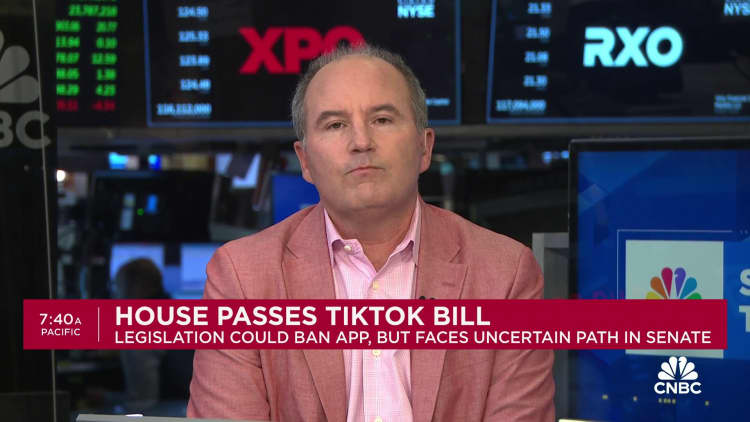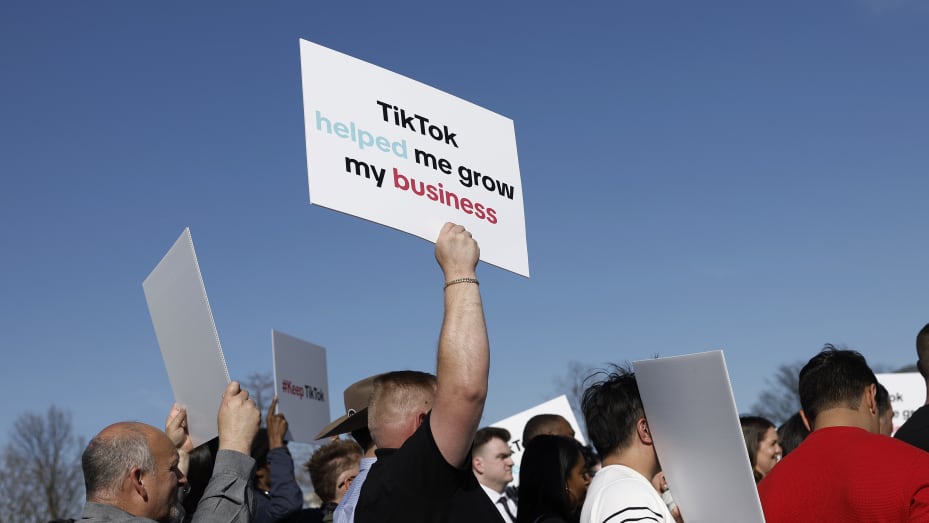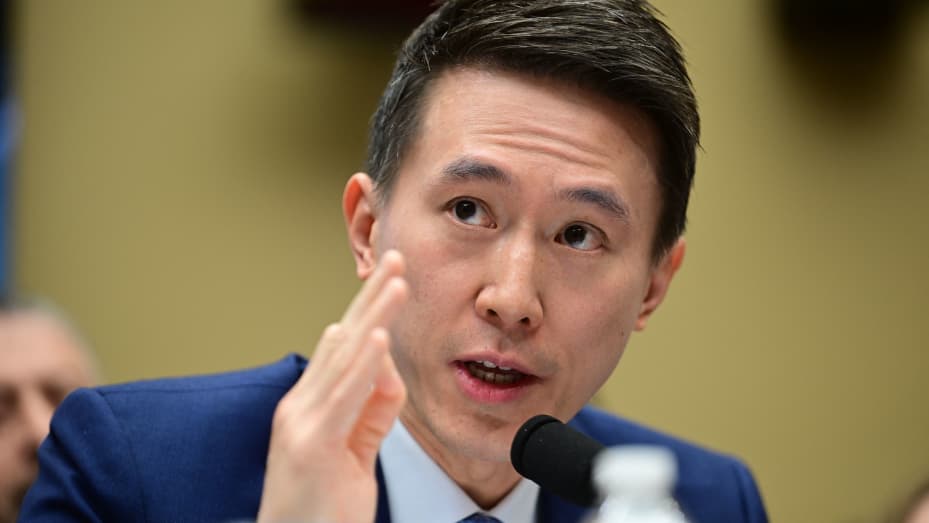House passes bill that could lead to a TikTok ban; fight shifts to the Senate
![]()
PUBLISHED WED, MAR 13 202410:39 AM EDTUPDATED 20 MIN AGO
House passes bill that could lead to a TikTok ban; fight shifts to the Senate
PUBLISHED WED, MAR 13 202410:39 AM EDTUPDATED 20 MIN AGO
Jonathan Vanian@IN/JONATHAN-VANIAN-B704432/
SHAREShare Article via FacebookShare Article via TwitterShare Article via LinkedInShare Article via Email
KEY POINTS
- The House approved the legislation, dubbed the Protecting Americans from Foreign Adversary Controlled Applications Act, that calls for China tech giant ByteDance to divest TikTok or the popular social video app will effectively be banned in the U.S.
- The bill now heads to the Senate where it faces an uncertain future as senators appear divided about the legislation.

WATCH NOW
VIDEO03:55
House passes TikTok bill: What investors need to know
The House approved a bill Wednesday that calls for China tech giant ByteDance to divest TikTok or the popular social video app will effectively be banned in the U.S.
The measure passed with a resounding 352-65 vote and with one member voting present.
The legislation, dubbed the Protecting Americans from Foreign Adversary Controlled Applications Act, was introduced March 5 by Reps. Mike Gallagher, R-Wis., and Raja Krishnamoorthi, D-Ill., of the House Select Committee on the Chinese Communist Party. Two days later, House members on the Energy and Commerce Committee voted unanimously to approve the bill, which refers to TikTok as a threat to national security because it is controlled by a foreign adversary.
The bill now heads to the Senate where it faces an uncertain future as senators appear divided about the legislation, and other federal and state-led efforts to ban TikTok have stalled.
“This process was secret and the bill was jammed through for one reason: it’s a ban,” a TikTok spokesperson said after the vote was passed. “We are hopeful that the Senate will consider the facts, listen to their constituents, and realize the impact on the economy, 7 million small businesses, and the 170 million Americans who use our service.”
President Joe Biden, who created an official TikTok account in February as part of his election campaign, has previously said that he would sign the bill if it is passed, and White House press secretary Karine Jean-Pierre acknowledged that the White House is providing “technical support” in the crafting of the legislation. Jean-Pierre said in a media briefing March 6 that once “it’s on legal standing and it’s in a place where it can get out of Congress, then the President would sign it.”

Participants hold signs in support of TikTok at a news conference outside the U.S. Capitol Building on March 12, 2024 in Washington, DC.
Anna Moneymaker | Getty Images
Although House members who drafted the bill have previously said that it “does not ban TikTok,” the legislation in its current form requires ByteDance to divest TikTok within roughly six months in order for the app “to remain available in the United States.” If the bill is enacted, app store owners such as Apple and Google along with internet-hosting companies would be prohibited from supporting TikTok and other apps that are linked to ByteDance.
More on the TikTok ban bill
- House passes bill that could lead to a TikTok ban; fight shifts to the Senate
- Trump says a TikTok ban would empower Meta, slams Facebook as ‘enemy of the people’
- Biden says he’ll ban TikTok if Congress passes bill, but he’s campaigning on it until then
- TikTok creators look for other places to make money as threat of U.S. ban gains steam
Lawmakers from both parties have claimed that TikTok poses a national security risk because of the app’s alleged ties to the Chinese Communist Party, which TikTok CEO Shou Zi Chew has denied during Senate hearings. On the other hand, tech policy and civil liberties organizations such as the American Civil Liberties Union and the Knight Institute have opposed the bill over concerns that it would violate First Amendment rights.

TikTok CEO Shou Zi Chew testifies before the House Energy and Commerce Committee hearing on “TikTok: How Congress Can Safeguard American Data Privacy and Protect Children from Online Harms,” on Capitol Hill, March 23, 2023, in Washington, DC.
Jim Watson | Afp | Getty Images
Meanwhile, Republican presidential nominee Donald Trump said in an interview with CNBC earlier this week that he’s concerned that banning TikTok would also make Facebook parent Meta a stronger company.
“Without TikTok, you can make Facebook bigger, and I consider Facebook to be an enemy of the people,” Trump said.
The former president’s comments were noteworthy considering that the Trump administration, citing national security concerns, previously tried to remove TikTok from app stores in 2020 and also called on ByteDance to divest the app. That same year, Microsoft was mulling an acquisition of TikTok in a deal ranging between $10 billion and $30 billion, but ultimately talks between the two companies fell through and the Biden administration eventually revoked the Trump administration’s order.
In the chance that the latest TikTok bill passes, Angelo Zino, a vice president and senior equity analyst at CFRA Research, told CNBC, it’s possible that TikTok’s U.S.-only business “could fetch a valuation north of $60 billion” when “looking at peer valuations in the market.”

































![Lieutenant-Colonel Robert Rogers (7 November 1731 – 18 May 1795) was a British Army officer and frontiersman. Born in Methuen, Massachusetts, he fought in King George’s War, the French and Indian War and the American Revolutionary War. During the French and Indian War, Rogers raised and commanded Rogers’ Rangers, a ranger unit trained for carrying out asymmetric warfare.[2][3](https://www.cowboyron.com/wp-content/uploads/2022/05/1262463_580743685323360_2133853937_o1-1-150x150.jpg)
















![Billie Joe Armstrong & Norah Jones – Silver Haired Daddy Of Mine [Music Video]](https://www.cowboyron.com/wp-content/uploads/2022/11/Al_St._John1-100x100.jpg)























